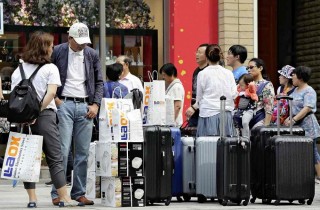Loading
Search
▼ China Stands to Gain by Allowing Group Tours to Japan
- Category:Other
By lifting its ban on group tours to Japan and other countries, China aims to increase traffic to and from various countries to help promote its economic development. After Beijing ended its strict zero-COVID policy, it was required to respond to the demand of people who want to travel abroad.
China’s culture and tourism ministry announced Thursday that the move was aimed at helping the country’s economic and social development. The Chinese Foreign Ministry cited a growing desire among Chinese people to travel abroad as the reason behind the measure.
Japan is an especially popular destination for Chinese tourists since it is geographically close and is an easy place in which to travel. A 22-year-old company employee in Shanghai, who has longed to go to Japan to see a concert by a certain Japanese idol, said cheerfully, “I finally can see my favorite.”
Shanghai Spring International Travel Service Ltd., a major travel agency in Shanghai, resumed sales for Japan tours on Thursday morning, and nine people booked September tours to Okinawa. Also, the number of inquiries doubled. “More and more people will want to go to Japan going forward,” the vice president of the travel agency said.
The bilateral relationship between Japan and China is deteriorating partly because China continues to oppose the release of treated water from the Fukushima No. 1 nuclear power plant into the sea.
This caused many people to worry that the political conflict was affecting people-to-people interactions. Under such circumstances, China decided to lift the ban on group tours, a move that will give greater advantage to Japan, apparently because it wanted to separate the issue from politics and promote economic exchanges with Japan.
To boost economic exchanges between the two countries, it is necessary to increase the traffic of businesspeople and others between Japan and China, but there is an obstacle to this.
While Beijing had waived the visa requirement for Japanese nationals planning to stay in China for up to 15 days before the COVID-19 pandemic started, it no longer offers that exemption, citing “reciprocity” as the reason.
The Japanese and Chinese governments are currently making arrangements for a meeting between Prime Minister Fumio Kishida and Chinese Premier Li Qiang on the sidelines of the summit of the Association of Southeast Asian Nations to be held in Indonesia in early September. China could possibly use the visa exemption issue for leverage in negotiations with Japan.
China’s culture and tourism ministry announced Thursday that the move was aimed at helping the country’s economic and social development. The Chinese Foreign Ministry cited a growing desire among Chinese people to travel abroad as the reason behind the measure.
Japan is an especially popular destination for Chinese tourists since it is geographically close and is an easy place in which to travel. A 22-year-old company employee in Shanghai, who has longed to go to Japan to see a concert by a certain Japanese idol, said cheerfully, “I finally can see my favorite.”
Shanghai Spring International Travel Service Ltd., a major travel agency in Shanghai, resumed sales for Japan tours on Thursday morning, and nine people booked September tours to Okinawa. Also, the number of inquiries doubled. “More and more people will want to go to Japan going forward,” the vice president of the travel agency said.
The bilateral relationship between Japan and China is deteriorating partly because China continues to oppose the release of treated water from the Fukushima No. 1 nuclear power plant into the sea.
This caused many people to worry that the political conflict was affecting people-to-people interactions. Under such circumstances, China decided to lift the ban on group tours, a move that will give greater advantage to Japan, apparently because it wanted to separate the issue from politics and promote economic exchanges with Japan.
To boost economic exchanges between the two countries, it is necessary to increase the traffic of businesspeople and others between Japan and China, but there is an obstacle to this.
While Beijing had waived the visa requirement for Japanese nationals planning to stay in China for up to 15 days before the COVID-19 pandemic started, it no longer offers that exemption, citing “reciprocity” as the reason.
The Japanese and Chinese governments are currently making arrangements for a meeting between Prime Minister Fumio Kishida and Chinese Premier Li Qiang on the sidelines of the summit of the Association of Southeast Asian Nations to be held in Indonesia in early September. China could possibly use the visa exemption issue for leverage in negotiations with Japan.
- August 14, 2023
- Comment (0)
- Trackback(0)


